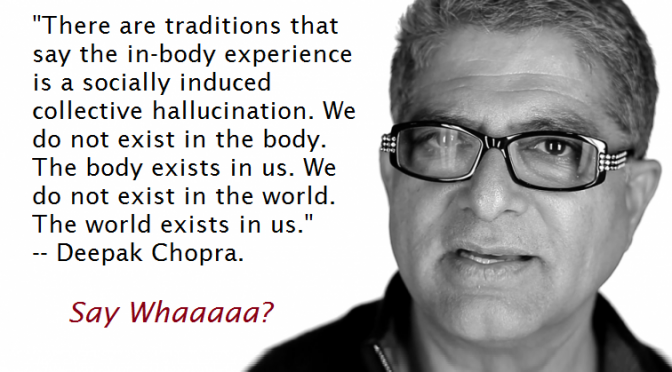A “deepity” is a term that was introduced by Daniel Dennett in his speech to the American Atheists conference (2009). It was apparently coined by a friend’s teenage daughter.
A deepity is, according to RationalWiki:
“A statement that is apparently profound but actually asserts a triviality on one level and something meaningless on another. Generally, a deepity has (at least) two meanings: one that is true but trivial, and another that sounds profound, but is essentially false or meaningless and would be “earth-shattering” if true.”
The example Dennett uses to illustrate a deepity is the phrase “love is just a word.” On one level the statement is perfectly true (i.e., love is a word) but the deeper meaning of the phrase is false; love is many things — a feeling, an emotion, a condition — and not simply a word.
Another is “God is love”. This is an appeal to emotion, and it hits home with many people; but in reality it is a deepity. It is false on the face of it. No matter whom you are, god is not an emotion. And when looked deeper into it you cannot, by any stretch of the imagination, call the god of the Bible, who would burn and drown people, and give his own followers plagues for any rule-infringement; Love. (Besides that, we already have a perfectly good word for love, its love. Why confound that word with god, a concept that has so much extra baggage for so many people.)
Whenever somebody tries to set themselves up as a leader in a particular field, they can either earn their position through actions or evidence, or completely skip that step and go directly to assertions; assertions that they then expect their followers to accept without question.
In my opinion, Deepak Chopra is one of the latter. Although he is educated man (he’s an MD), he moved over to the “field” of alternative medicine in 1996, and has been selling his brand of AM ever since. Alternative medicine is not recognized by science or by physicians as having any value other than the placebo value, i.e. people can sometimes get better if they believe that a medicine, or procedure, is effective. If there were any alternative medicine practices that actually worked, they wouldn’t be called alternative medicine, it would be called medicine.
Deepak uses deepities, and scientific mumbo-jumbo to confuse and convince his audience that he actually has answers to the most puzzling questions of the universe. Without evidence, peer-reviewed literature or a physics background, he just makes statements, calls them fundamental truths, throws in some poorly understood scientific terms and voila, instant following.
Some examples of Deepak’s deepities are:
“Seeing angels and seeing a tree, mountain, or cloud are equally inexplicable.”
“Reality is created by consciousness”
“The secret of the universe explores quantum fulfillment”
“I think consciousness is nonlocal.” It is “a field, a superposition of possibilities”.
On no scientific or philosophical level, do any of these make any sense. Deepak comes from a society that is very oriented in the mystical. He is using that orientation, some vague terms and the gullibility of the general public, to sell books and persuade followers.
When he’s not dealing in deepities, he makes wild jumps of logic. In his book Quantum Healing, he states that:
“If being happy, sad, thoughtful, exited and so on all require the production of neuropeptide and neurotransmitters in our brain cells, then the immune cells must also be happy, sad, thoughtful, excited – indeed they must be able to express the full range of “words” that neurons do.”
Intelligence, i.e. the mind, is not represented in individual cells; it is an emergent property of many billions of brain cells working together to form thoughts and emotions.
Deepak frequently holds debates with eminent scientists who pretty much take exception to his entire spiel. He recently attended one with neurobiologist Sam Harris and physicist Leonard Mlodinow. They contradicted him at every turn, but in the end it enabled him to write an article about it on the Huffington Post (which often gives this type of pseudo-science a platform) where he ended his article with: “This is an exciting time in the development of the understanding of consciousness and the deepest knowledge of physics. I am delighted to be engaged in this discussion with such eminent minds.”
Right, he is using the stature of these eminent scientists to elevate his own status. He is not engaged in the “development of the understanding” of these things any more that you would be if an actual neurologist and physicist just told you that your theories were a bunch of crap.
Try reading Deepak again, this time with a skeptical eye. An eye focused on deepities and pseudo-scientific claims that are aimed directly at your emotions. Better yet, read Harris and Mlodinow. You’ll actually come away with some knowledge of those subjects.
Deepak, if you want to promote eastern mysticism then treat it like you do alternate medicine. Call it what it is; Mysticism. You’ll still have followers, but you won’t be misrepresenting yourself, and your field, to people who are looking for a genuine understanding of the universe.

